Keeping your car clean is important for both its appearance and its longevity. A clean car is more attractive, and it’s also easier to spot any potential problems, such as scratches or dents. In addition, a clean car will last longer because the dirt and grime that builds up over time can damage the paint and other surfaces.
There are a variety of ways to clean your car, but one of the most effective methods is to use a pressure washer. Pressure washers can remove dirt, grime, and even stubborn stains from your car’s exterior, and they can do it quickly and easily.
However, before you use a pressure washer on your car, there are a few things you need to know. One of the most important questions is: can you use car soap in a pressure washer?
Understanding Car Soaps
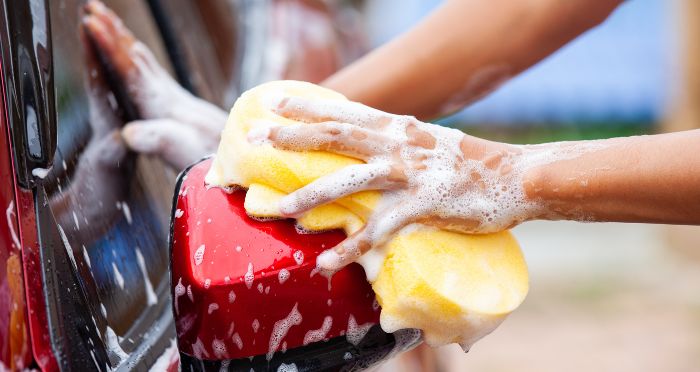
Car soaps are designed to clean cars without damaging the paint or other surfaces. They typically contain a variety of ingredients, including surfactants, detergents, and emulsifiers. Surfactants help to break down dirt and grime, detergents help to remove dirt and grime from the car’s surface, and emulsifiers help to keep the dirt and grime suspended in the water so that it can be rinsed away.
Car soaps come in a variety of forms, including liquids, gels, and foams. Liquid car soaps are the most common type, and they’re easy to apply and rinse away. Gel car soaps are more concentrated than liquid car soaps, and they can be used to clean more stubborn dirt and grime. Foam car soaps are the least common type, but they can be very effective at cleaning cars.
Understanding Pressure Washers
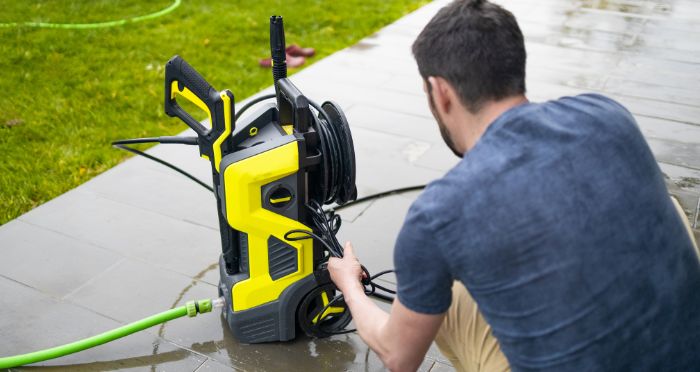
Pressure washers are tools that use high-pressure water to clean surfaces. They can be used to clean a variety of surfaces, including cars, driveways, patios, and sidewalks.
Pressure washers come in a variety of sizes and styles. The most common type of pressure washer is a gas-powered pressure washer. Gas-powered pressure washers are powerful and can be used to clean large areas quickly. However, they can be noisy and require more maintenance than electric pressure washers.
Electric pressure washers are less powerful than gas-powered pressure washers, but they’re quieter and easier to maintain. They’re a good option for people who only need to clean small areas, such as their car.
Can You Use Car Soap in a Pressure Washer?
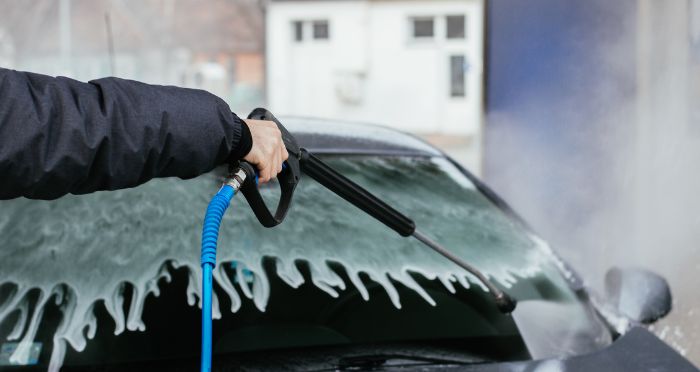
Yes, you can use car soap in a pressure washer. However, there are a few things you need to keep in mind.
- Use the right type of car soap. Not all car soaps are created equal. Some car soaps are designed for use with pressure washers, while others are not. If you use the wrong type of car soap, it can damage your car’s paint.
- Use the right amount of car soap. Too much car soap can create thick suds that can block the pressure washer’s nozzle. Too little car soap won’t be effective at cleaning your car.
- Use the right pressure setting. If you use too much pressure, you can damage your car’s paint. Start with a low-pressure setting and increase the pressure as needed.
Here are some steps on how to use car soap in a pressure washer:
- Prepare your car. Wash your car with clean water to remove any dirt or debris.
- Mix the car soap with water. Follow the instructions on the car soap label.
- Attach the car soap to the pressure washer. Most pressure washers have a detergent tank or a foam cannon attachment.
- Turn on the pressure washer. Start with a low-pressure setting and increase the pressure as needed.
- Apply the car soap to your car. Hold the pressure washer nozzle at least 6 inches away from your car and spray the car soap onto the surface.
- Rinse your car. Once you’re finished applying the car soap, rinse your car with clean water.
- Wax your car. Waxing your car will help to protect the paint and keep it looking its best.
By following these steps, you can safely and effectively use car soap in a pressure washer.
Pressure Washer Detergents: A Buyer's Guide
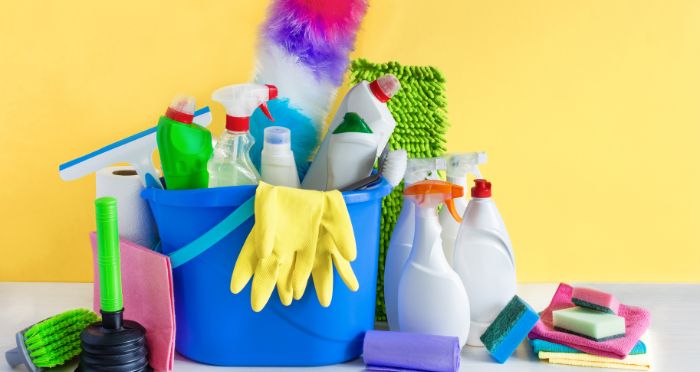
Pressure washer detergents are a type of cleaning agent that is designed to be used with pressure washers. They are typically made with surfactants, which help to break down dirt and grime so that they can be easily removed by the pressure washer. Pressure washer detergents can be used on a variety of surfaces, including cars, boats, patios, and driveways.
There are many different types of pressure washer detergents available on the market. Some of the most common types include:
- Car wash soap: Car wash soap is specifically designed to be gentle on car paint and to be effective at removing dirt, grime, and other debris.
- Degreaser: Degreaser is a powerful cleaner that can be used to remove grease, oil, and other tough stains from cars.
- All-purpose cleaner: All-purpose cleaner can be used to clean a variety of surfaces, including cars. However, it is important to test the cleaner in an inconspicuous area first to make sure it does not damage the paint.
- Green cleaner: Green cleaners are made with natural ingredients and are designed to be environmentally friendly. They are a good option for people who are looking for an alternative to traditional car wash soaps and detergents.
When choosing a pressure washer detergent, it is important to consider the type of surface that you will be cleaning. For example, if you are cleaning your car, you will need to use a car wash soap that is specifically designed for cars. If you are cleaning your patio, you can use an all-purpose cleaner.
It is also important to consider the type of pressure washer that you have. Some pressure washers have a detergent tank, while others do not. If your pressure washer does not have a detergent tank, you will need to use a pressure washer detergent that comes in a spray bottle.
Finally, it is important to read the manufacturer’s instructions before using any pressure washer detergent. This will help you to use the detergent safely and effectively.
Here are some additional tips for choosing a pressure washer detergent:
- Consider the type of surface that you will be cleaning.
- Consider the type of pressure washer that you have.
- Read the manufacturer’s instructions before using any pressure washer detergent.
By following these tips, you can choose the right pressure washer detergent for your needs.
Benefits Of Using A Pressure Washer To Clean Your Car
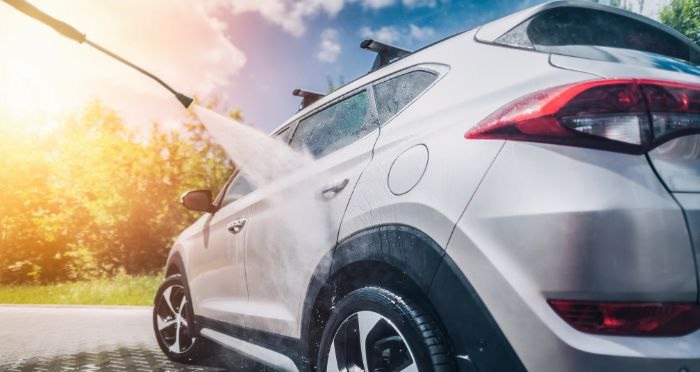
Here are some of the benefits of using a pressure washer to clean your car:
- It’s fast and easy. Pressure washers can clean your car much faster than you could by hand. This is because they apply high-pressure water that can quickly loosen and remove dirt, grime, and other debris.
- It’s more thorough. Pressure washers can reach areas that are difficult to clean by hand, such as the wheel wells and the undercarriage of your car. This means that you can be sure that your car is getting a thorough cleaning.
- It’s safer. Pressure washers can be dangerous if used improperly, but when used safely, they can be a great way to clean your car. By following the safety instructions that come with your pressure washer, you can avoid any potential hazards.
- It’s more affordable. The cost of buying a pressure washer is a one-time expense, and the cost of operating it is relatively low. This makes it a more affordable option than hiring a professional to clean your car.
Additional Tips
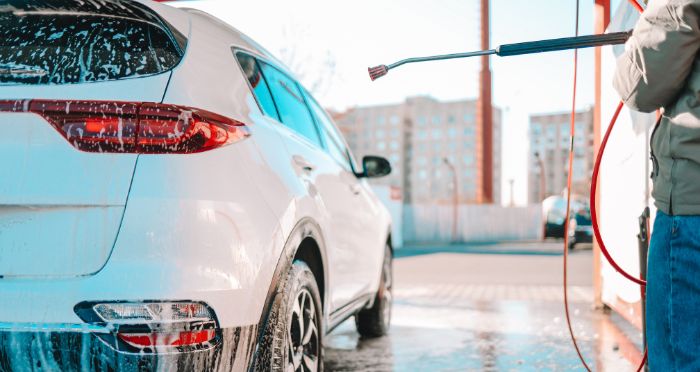
By following these tips, you can safely and effectively clean your car with a pressure washer.
- Choose the right pressure washer. There are a variety of pressure washers available on the market, so it’s important to choose one that is the right size for your needs. If you have a small car, then you can get away with using a smaller pressure washer. However, if you have a large truck or SUV, then you’ll need a larger pressure washer.
- Use the right nozzle. Pressure washers come with a variety of nozzles, so it’s important to use the right one for the job. For general cleaning, you’ll want to use a fan nozzle. However, if you need to remove tough stains, then you can use a rotating nozzle.
- Use the right amount of pressure. The amount of pressure that you use will depend on the type of surface that you’re cleaning. For example, you’ll need to use less pressure when cleaning your car’s paint than when cleaning the undercarriage of your car.
- Be careful not to overspray. Overspray can damage your car’s paint and other surfaces. To avoid overspray, hold the pressure washer nozzle at least 6 inches away from the surface that you’re cleaning.
- Rinse thoroughly. Once you’re finished cleaning your car, be sure to rinse it thoroughly with clean water. This will remove any soap residue that could damage your car’s paint.
Risks Of Using Car Soap In A Pressure Washer
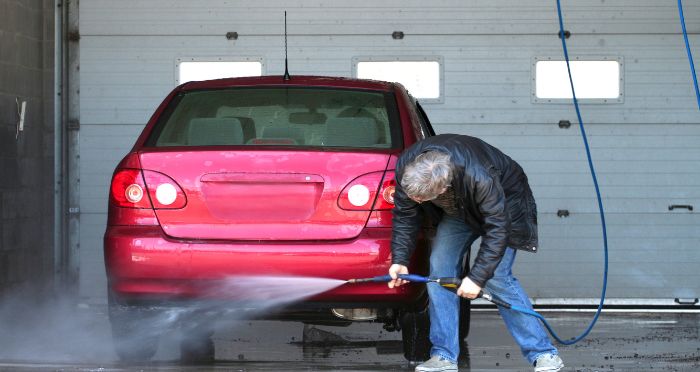
Here are some of the risks of using car soap in a pressure washer:
- Damage to the car’s paint. The high-pressure water from a pressure washer can damage the car’s paint if it is too close to the surface. This is especially true if you use a pressure washer that is too powerful.
- Etching of the car’s glass. The high-pressure water from a pressure washer can etch the car’s glass, which can make it difficult to see through. This is especially true if you use a pressure washer that is too powerful.
- Damage to the car’s seals and gaskets. The high-pressure water from a pressure washer can damage the car’s seals and gaskets, which can lead to leaks.
- Rinsing away wax and sealant. The high-pressure water from a pressure washer can rinse away the car’s wax and sealant, which can leave the car more vulnerable to scratches and fading.
- Overspray of soap. If you use too much car soap, it can overspray and get on other surfaces, such as your driveway or sidewalk. This can make it difficult to clean up and can leave behind a residue that can be unsightly.
Final Thoughts
- Pressure washers can be a great way to clean your car, but it’s important to use them safely and effectively. By following the tips in this article, you can help to prevent damage to your car.
- If you’re not comfortable using a pressure washer, you can always take your car to a professional car wash. They will have the experience and knowledge to clean your car safely and effectively.
- No matter how you choose to clean your car, it’s important to do it regularly. This will help to keep your car looking its best and will extend its lifespan.
I hope this article has been helpful. If you have any further questions, please feel free to ask.